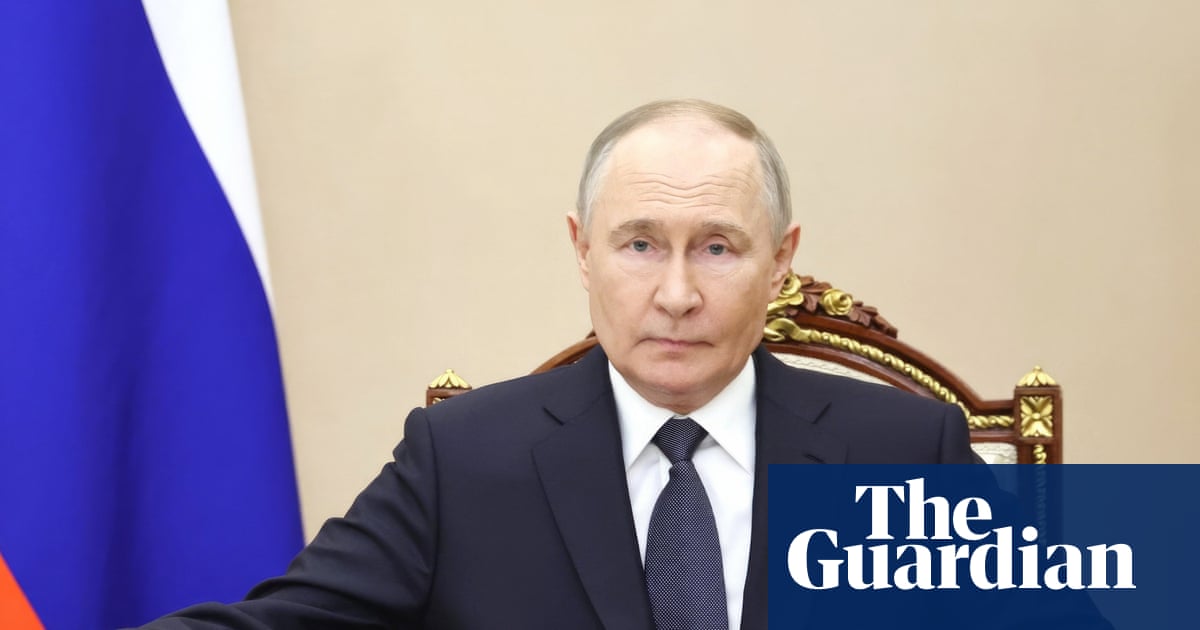The UK and Europe have announced major sanctions against Russia as it became clear that Monday’s call between Donald Trump andVladimir Putinhad failed to deliver any meaningful concessions from Moscow.
The Ukrainian president,Volodymyr Zelenskyy, accused Russia of “trying to buy time in order to continue its war and occupation”.
The UK said its sanctions would target dozens of entities “supporting Russia’s military machine, energy exports and information war, as well as financial institutions helping to fund Putin’s invasion of Ukraine”.
“Putin has so far not put in place the full, unconditional ceasefire that President Trump has called for, and which President Zelenskyy endorsed over two months ago,” the Foreign Office said.
Shortly afterwards the EU foreign policy chief, Kaja Kallas, said the EU had approved sanctions targeting Russia’s shadow fleet of about 200 vessels and that more sanctions were in the pipeline.
“More sanctions on Russia are in the works,” Kallas said in a post on X. “The longer Russia wages war, the tougher our response.”
On Monday evening Trump indicated the US was not ready to join European sanctions efforts.
Zelenskyy said Ukraine had no doubt the war “must end at the negotiating table” but added that there must be clear and realistic proposals on the table and called for more pressure on Russia.
“We are working with partners to put pressure on the Russians to behave differently. Sanctions matter, and I am grateful to everyone who makes them more tangible for the perpetrators of the war,” he said.
The announcement of the new sanctions underlined thefailure of Trump’s attempted mediationin the war, as it became clear in Kyiv and other European capitals that Trump had in effect accepted Putin’s defiance of calls for an immediate ceasefire.
Instead, Trump placed the onus on Kyiv and Moscow to negotiate between themselves, perhaps under the auspices of papal mediation.
While Trump was at pains on Monday to emphasise the “excellent” call he had with Putin, suggesting that talks between the two sides would begin “immediately”, it quickly became clear that he had backed away from any demand that Russia declare an immediate ceasefire.
Describing future talks, Trump said: “The conditions will be negotiated between the two parties, as it can only be, because they know details of a negotiation that nobody else would be aware of.”
Trump’s comments appeared to reflect a waning enthusiasm for engagement with attempts to end the war in Ukraine, after comments from the White House that he was “weary and frustrated”, and he again threatened that he was “just going to back away” after the call with Putin.
Trump appeared to again defer to Moscow by backing Putin’s call for negotiations between Ukraine and Russia.
While Trump suggested he was losing patience with Putin over Moscow’s intransigence, that mood was not reflected in the White House account of the call.
Some analysts suggest Trump appears to be employing a familiar tactic from his second term in office, including in the brief campaign against Yemen’s Houthis and over aspects of his trade policy: claiming success where none exists and moving on.
Despite Monday’s two-hour phone call, Russia’s position remains unchanged, insisting that agreements on its long-held and maximalist demands are a precondition for a possible temporary ceasefire.
That was underlined by the remarks of the Kremlin’s spokesperson, Dmitry Peskov, after the Trump-Putin call that there was “no timeline” for preparing a memorandum for future talks. Peskov said: “It’s clear that everyone wants to do this as quickly as possible, but of course the devil is in the details.”
At a press briefing on Monday night, Zelenskyy confirmed reports from last week’s inconclusive talks in Istanbul between the two sides that Russia was demanding that Ukraine withdraw its forces from five regions, including territory not occupied by Russia.
“It’s our land, we won’t withdraw our troops from our territory … it means that they don’t want peace … if they demand what they know we won’t agree to,” Zelenskyy said.
The inconclusive outcome of the call underlined growing concern among senior officials in Kyiv that the US has been consistently out-gamed by Putin with his clear vision of his objectives, not least since Trump took office.
Trump’s failure to put pressure on Putin has confirmed the fears of officials in Kyiv that Trump is more interested in future business deals with Russia than using US influence to secure a quick ceasefire.
With the US at best semi-detached, Ukraine is focusing its efforts on persuading Europe to match its rhetoric against Moscow with more sanctions and military aid.
